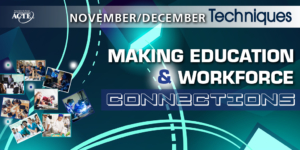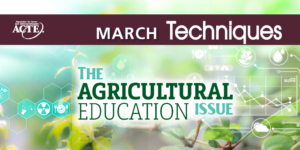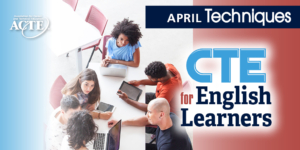As Techniques looks forward to the school year with our VISION in the Spotlight issue coming soon, we’re also looking back. Our 2022–23 Year in Review features some of the most engaging content we’ve published in print and online since the fall of 2022. Each year, in Techniques, we celebrate the strength and successes of high-quality CTE, and we’ll continue to discuss the common challenges educators face.
Read Techniques: Year in Review, 2022–23
>nbsp;
Make beats, learn to code
Your Voice is Power (YVIP) illustrates how music, computer science, and entrepreneurship can inspire social change. The YVIP educational collaboration expands computer science education to a more diverse group of students — those from underserved communities and populations currently underrepresented in technology careers. It builds confidence and helps students feel more empowered in their work. “I was able to bridge my love for coding with my interest in music,” said a 2021 YVIP student participant. READ MORE

Agriculture, aerospace >amp; data science
Today’s agriculture students are the industry leaders of tomorrow. And they must begin to learn new and innovative production methods now. Digital agriculture involves the interdisciplinary development of technology to collect, integrate and transmit data into decision-making tools. Ultimately, the adoption of digital agriculture practices will improve food and fiber production by allowing farmers to make better and more precise management decisions. The result will be an ability to produce more food on less land. READ MORE

Educator externships connect the classroom >amp; the workplace
Educators in Virginia have access to an innovative work-based learning (WBL) program known as EXCITE. That stands for Exploring Careers through Industry Teacher Externships. Teachers and counselors refine old skills, gain new ones, learn about changing industry standards and skills needed for local jobs, and make connections for students. Together, they gain an increased ability to explain the value of what students are learning, which often leads to cooperative learning and higher levels of collaboration. READ MORE

Spark a revolution in manufacturing
Students, educators and the workforce benefit from a digital apprenticeship in computer numerical control (CNC) manufacturing technology. Backed by industry partners, and used in thousands of educational institutions, digital apprenticeships can offer significant benefits. Spaces wherein curriculum is readily available, anytime, anywhere, grant flexibility and freedom for students to learn on their terms. They allow students to acquire knowledge in accordance with their learning preference when time allows. READ MORE

A juggling act in the classroom
The teacher shortage has compelled secondary school administrators to seek alternative ways of staffing CTE classrooms. school districts may hire a teacher with a bachelor’s degree through provisional licensing. In other cases, teacher preparation programs regularly get calls to hire candidates before they have completed student teaching. These unique situations provide rich opportunities for research. So, three university faculty began a yearlong study to learn about supports that may be useful for new teacher success. READ MORE

Fighting burnout in agricultural education
After my daughter was born, I began to notice that things like time and attention became much more uncomfortable to balance. I started to feel guilty because I couldn’t devote the same amount of time to my students and my school. At the same time, I felt as though I was sometimes putting my job ahead of my new baby. I was only one person, but I felt like I had to be a dynamic teacher, a superstar FFA advisor, a doting and attentive mother, and a loving wife. Something had to give. So, in early 2020, I decided that the following school year would be my last in the classroom. READ MORE

Support English learners in CTE programs
For English learners (ELs), access to CTE can be limited due to a variety of factors. These include language proficiency restrictions, limited translation services and lack of family outreach. Educators must act with urgency to support representation and engagement. For example, there may be limited outreach conducted in EL families’ home languages about the CTE programs available to students. To address this challenge, set up outreach structures. Because when ELs are intentionally included, they may succeed in whichever path they choose. READ MORE

Engaging students through global competence
Educators who understand the international connections within their career fields can help students begin to develop global competence. Integrating global competence throughout CTE programs of study can have a widespread cultural impact. It fosters a culture of learning and respect, wherein all stakeholders learn to think critically about the world, challenge their perspectives, communicate with diverse others, and take action when necessary. Becoming globally competent first means understanding what global competence means. READ MORE

>nbsp;
Lia Milgram is senior managing editor for ACTE.






